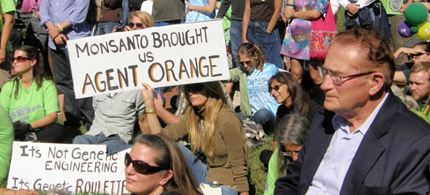
Don't Put Monsanto in Charge of Ending Hunger in Africa
Yifat Susskind, MADRE News
 his past weekend, President Obama hid out from protesters at Camp David. He was hosting the leaders of the world's eight wealthiest economies, known as the G8. As they readied to meet, on Friday, Obama put forward his New Alliance for Food Security and Nutrition.
his past weekend, President Obama hid out from protesters at Camp David. He was hosting the leaders of the world's eight wealthiest economies, known as the G8. As they readied to meet, on Friday, Obama put forward his New Alliance for Food Security and Nutrition.
This occasion gave Rajiv Shah, the administrator of the US Agency for International Development, the chance to make an astonishing statement:
"We are never going to end hunger in Africa without private investment. There are things that only companies can do, like building silos for storage and developing seeds and fertilizers."
That's news to millions of women farmers in Africa. Their harvests feed their families and generate income that sustains local economies. For generations, they have been doing just those things: storing their harvests, protecting and developing seeds, using natural fertilizers.
Smallholder women farmers save and exchange seeds that help keep local crops viable. They demonstrate how to adapt to climate change by adjusting planting cycles, experimenting with new drought-resistant crops and more. They produce crucial food supplies using the small-scale, organic methods that are increasingly recognized as vital to the health of the planet - and everyone who lives on it.

Should the company that brought us Agent Orange be trusted to end hunger in Africa? (photo: Deuts
There are differences, of course. Unlike big companies, small-scale women farmers do not grab millions of acres of land for monoculture plantations that destroy local biodiversity. They do not develop the terminator seeds that hold farmers hostage to the seed patent rights of corporations. They are not the inventors of chemical fertilizers that worsen climate change.
Those honors belong to the very companies that President Obama is inviting to oversee Africa's food security. We know that their primary goal is not anybody's food security but their own bottom line. That's why it's governments, and not corporations like Monsanto, that should bear responsibility for funding and developing agriculture. It is simply not true that only companies can build silos and develop seeds and fertilizers.
President Obama anticipated these criticisms when he addressed "whether this New Alliance is just a way for governments to shift the burden onto somebody else." He was quick to assure that, even in hard economic times, his administration would continue to make investments in development aid. Let's make sure that those investments work to prioritize the right to food over corporate profits.
Because here's the truth: we're never going to end hunger in Africa without upholding the rights of smallholder women farmers who feed the continent and care for its ecosystems.
Yifat Susskind is MADRE's Executive Director.
